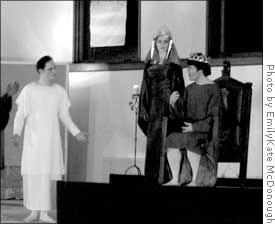
| << Front page | Arts | February 11, 2005 |
Student directs medieval musical drama
Ludus Danielis gives Obies tongue-in-cheek
á la 1200
 |
|
| Medieval melange: Castmembers of Ludus Danielis honor its king and namesake. | |
The Old Testament was brought to life at Oberlin last Tuesday and Wednesday by Ludus Danielis, a vibrant medieval musical drama (with an unknown composer) based on vignettes from the Book of Daniel. This Winter Term production was directed by senior composition major Mary Larew and performed by a talented cast of students drawn from a plethora of disciplines in both the Conservatory and the College. The Carnegie building’s Root Room marked the final performance site for Ludus Danielis, as the cast went on tour to Cleveland and Boston just before second semester began.
The narrative of Ludus Danielis begins with King Belshazzar of Babylon and the members of his court, who are merrily singing, dancing and drinking from sacred vessels that Belshazzar’s father once plundered from the Temple. When mysterious writing suddenly appears on the palace wall, the wisest scholars are called in to interpret the message. When these men fail to decipher the enigma, the Queen insists that Daniel be summoned. He successfully decodes the ominous message, which reads that King Belshazzar’s rule will be overthrown in the near future. Belshazzar is murdered that night and replaced by the Persian King Darius.
The second act portrays Darius’s court, where Daniel is honored for his prophetic abilities. Court members plot to overthrow Daniel by convincing Darius to sign a decree that forbids the worshipping of anyone but the King. When Daniel is caught praying to God, he is tossed into the lions’ den, but he is protected by angels because of his faith.
The Ludus Danielis cast members sang in Latin (a translation was printed so that audiences could follow the narrative) and mostly a cappella, with occasional accompaniment by period instruments including recorder, harp and vielle. Their voices blended seamlessly through the complex and often mysterious medieval harmonies and the balance within the chorus was excellent. Particularly notable musicians include the Queen, played by Caitlin Maura Smith, whose strong, clear tone convinced the audience of her regality, and, of course, Daniel, played by Samuel Sytsma, whose impressively high range, coupled with an all-white costume, gave him an ethereal, spiritual quality. In addition, all of the instrumentalists played with remarkable energy, clarity and attentiveness. Their talents were particularly highlighted during the various musical interludes, all of which were composed by Larew.
The characters in Ludus Danielis, as Larew comments in her notes, are “complicated, with multi-faceted personalities and quirks.” Although the work comes across as obviously allegorical, the characters are all quite dynamic and, in many cases, humorous. John Austin Clark made a hilarious King Darius, portraying the character’s sense of vanity which causes him to proclaim himself God for 30 days. The sight of Avery Brook, Joseph Kimmel and Chris Macklin growling in their lion suits definitely got a laugh out of the audience. The style of humor was unmistakably tongue-in-cheek, but subtle enough to entertain the audiences while not departing too much from the developing narrative.
If anything detracted from the audience’s enjoyment of this production, it could be attributed to the space in which it was performed. The Carnegie Root Room proved to be a less than desirable space for Ludus Danielis, mostly because the acoustics of the room seemed a little odd. It became apparent at several points during the show that the instrumentalists in the front of the audience and the singers entering or exiting at the other end of the room were having trouble hearing one another. In addition, the rows and rows of seating on the Root Room’s flat floor made it difficult for anyone behind the first row to see the action. Overall, however, the performance was very successful; Mary Larew and her crew wholly deserve recognition.
It was wonderful to see Conservatory and College students, studying
everything from music education to neuroscience, come together in the same
musical production. Moreover, the performance was remarkably smooth in light of
the fact that the cast had only been working together for one month. Seeing
Ludus Danielis was a great mid-week break for Oberlin audiences, who appeared to
be engaged and entertained throughout the entire evening.
About us
Subscriptions
Advertising
|